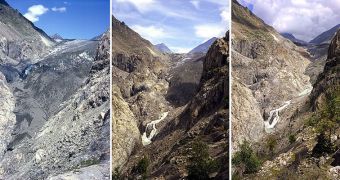In a new set of scientific investigations, it was revealed that some of the most prominent glaciers in the Alps were not melting and waning due to global warming alone. Scientists determined that naturally-occurring climate swings also contributed to the decline in ice masses, and this is very evident in the case of the Great Aletsch Glacier of Switzerland, the largest Alpine glacier there is. Over the past 100 years, the formation receded by a grand total of two kilometers, echoing the same situation that can be seen all over the Alps. Studies of an additional 1,500 smaller glaciers have shown that none of them is fairing any better than their larger cousin, Nature News reports.
According to the new studies, it would appear that natural climate swings account for about half of the total amount of lost ice. “This doesn't question the actuality, and the seriousness, of man-made climate change in any way. But what we do see is that current glacier retreat might be equally due to natural climate variations as it is to anthropogenic greenhouse warming,” explains University of Fribourg in Switzerland glaciologist Matthias Huss, who was also the leader of the new investigation. Details of the work appear in the latest issue of the esteemed scientific journal Geophysical Research Letters.
“This is the first detailed attribution of known climate forces on glacier behavior. Given the importance of glaciers to local water supply, this is essential information,” believes University of Innsbruck in Austria glaciologist Georg Kaser, who was not affiliated with the Swiss research effort. Experts say that the natural variation is given by the Atlantic multidecadal oscillation (AMO), a complex natural phenomenon which sees the temperature of the Atlantic Ocean increasing and decreasing by about 1 degree Celsius every 60 years or so. The process affects hurricanes, rainfall, and other weather patterns throughout Europe, including the Alpine glaciers.
“The widespread idea that glacier retreat is the sole consequence of increased air temperature is overly simplistic. Glaciologists have known for more than 50 years that glaciers are sensitive to a variety of climate variables, not all of which can be attributed to global warming,” Kaser adds further. “Without studies like this, climate science would actually be less credible than it is. Problems related to global warming are caused by a subtle mix of human activity and natural changes, and these new findings are a rare opportunity to illustrate this complexity in a comprehensible way. It is a question of scientific honesty to admit that not all the effects of climate change are solely the result of increased greenhouse gases,” concludes University of Geneva regional climate modeler Martin Beniston.

 14 DAY TRIAL //
14 DAY TRIAL //